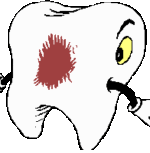Curcumin to treat gingivitis
 Periodontal diseases often lead to tooth loss. The most common forms include gingivitis and periodontitis, which are caused by plaque bacteria around the gums.
Periodontal diseases often lead to tooth loss. The most common forms include gingivitis and periodontitis, which are caused by plaque bacteria around the gums.
Researchers at Rangoonwala College of Dental Sciences and Research Centre, in Maharashtra, India, studied the effects of curcumin mouthwash. Here are their results and a summary of other recent studies.
First, the details
- 30 adult patients with generalized chronic gingivitis were randomly divided into 3 groups.
- Group 1 patients: Scaling and root planing followed by chlorhexidine mouthwash
- Group 2 patients: Scaling and root planing followed by curcumin mouthwash
- Group 3, patients: Only scaling and root planning
- Gingival and plaque indices were recorded at the start and after 7, 14 and 21 days.
And, the results.
- There was significant improvement in all 3 groups compared to the start of the study.
- Compared to the scaling and root planing group (Group 3), both curcumin and chlorhexidine groups had statistically significantly better results.
- There were no significant differences between the curcumin and chlorhexidine treatments.
The bottom line
The authors concluded, “Curcumin is comparable to chlorhexidine as an anti-inflammatory mouthwash. Thus, it can be considered as an effective adjunct to mechanical periodontal therapy.”
These findings support an earlier study by researchers in India, which concluded: “Chlorhexidine gluconate as well as turmeric mouthwash can be effectively used as an adjunct to mechanical plaque control methods in prevention of plaque and gingivitis.
Curcumin is found in the popular Indian spice, turmeric, which is a member of the ginger family (Zingiberaceae).
Other herbals studied as adjuncts to mechanical plaque control.
- Chlorhexidine with and without alcohol
- The alcohol-free rinse was as effective as the one containing alcohol in controlling plaque and reducing gingival inflammation.
- Frankincense
- May be applied to improve inflammation-based disease of gingival as an adjunct to the conventional mechanical therapy.
- Azadirachta indica (neem)
- As effective with fewer side effects compared to chlorhexidine, and may be used as adjunct therapy in treating plaque induced gingivitis.
4/9/13 9:56 JR